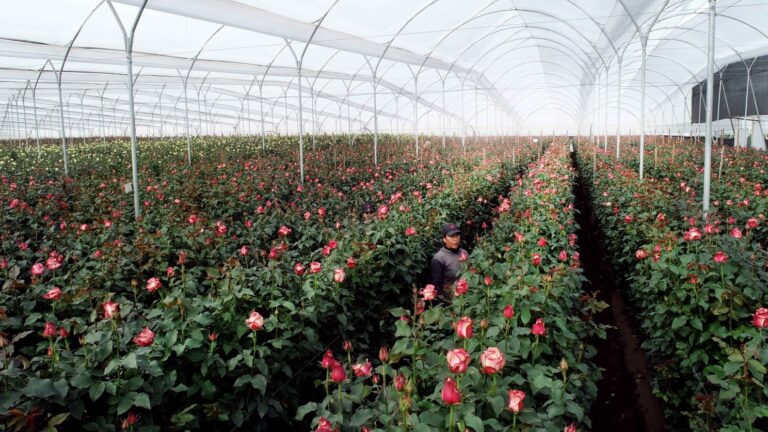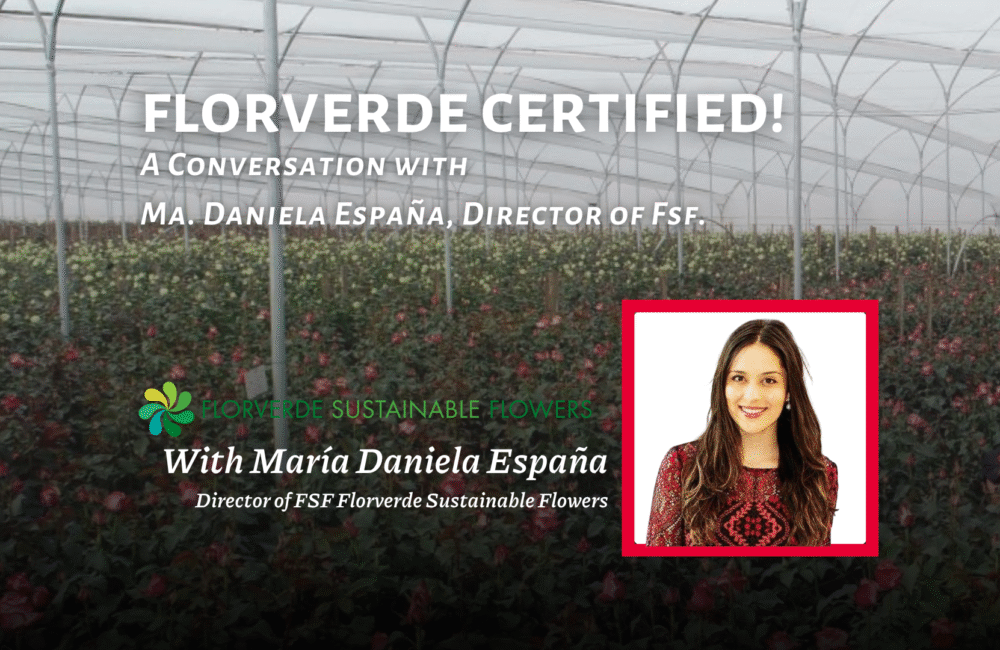At TESSA, we believe that sustainability is more than a commitment — it’s a path we choose every day. That’s why we’re proud to announce that we’ve received the Florverde Sustainable Flowers (FSF) certification, a seal that recognizes real, measurable impact across the floriculture industry.

To explore what this milestone means — and what it takes to earn it — we spoke with Maria Daniela España Gutiérrez, Director of Florverde Sustainable Flowers, about the certification, sustainability challenges, and the role companies like TESSA play in shaping a greener future.
As Director of FSF, I work to strengthen the connection between committed producers and buyers who value real, measurable, and transparent sustainability.
Q: What is Florverde and why is it relevant today?
A: Florverde Sustainable Flowers (FSF) is an international certification with 29 years of experience, specifically designed for the floriculture sector. Over nearly three decades, it has evolved into a global benchmark for sustainability in our industry, recognized by buyers, platforms, and international regulations.
Today, it’s a standard widely accepted in key markets and acknowledged by initiatives such as FSI 2025, the SSCI of The Consumer Goods Forum, and responsible sourcing policies like Walmart’s Health Pollinator Policy.

Q: What makes Florverde different from other environmental certifications?
A: Florverde has unique advantages over other seals:
It’s a standard tailored to the floriculture sector, with requirements that reflect the specific realities and challenges of the industry.
It includes a robust system of indicators that allows farms to measure their social and environmental performance monthly — a comparative and managerial tool for continuous improvement.
Full transparency: evaluation and certification processes are audited by third-party certification bodies, accredited and internationally recognized. Buyers have access to clear information. Currently, we work with over five bodies accredited by ANAB, SAE, and ONAC.
Broad international recognition in the U.S. and EU, with endorsements from FSI 2025, SSCI (CGF), IPM-Walmart, Eco.business Fund, Kroger, DFG, FM Group, among others.
Alignment with regulations in destination countries, which helps ensure compliance and reduce commercial risk.

Q: What are the most challenging criteria for companies to meet?
A: One of the main challenges is meeting input and waste management requirements, especially in response to growing market demands around pesticide residues. This requires not only detailed technical records, but also continuous improvement processes, staff training, and strict monitoring. The certification is also demanding in its measurement of environmental and social indicators and requires the implementation of formal management systems.
Getting certified with FSF is not just about meeting requirements; it’s an opportunity to organize, strengthen, and add value to operations — to create a culture of sustainability and build long-term habits.
Q: What real environmental impact does this certification have on the production chain?
A: FSF drives continuous improvement through structured plans for water savings, energy efficiency, waste reduction, and fair labor conditions. Certified farms must record and report their performance, enabling informed decision-making and clear communication of their positive environmental impact. This fosters a more responsible and sustainable value chain.
Q: What stood out in our process that led to the certification?
A: In TESSA’s case, we saw a high degree of preparation, a strong organizational structure, and a business culture aligned with the values of the certification. The commitment was evident from management all the way to field teams, which enabled a technical process that was both smooth and coherent.

Q: What good practices did you see that are worth replicating?
A: TESSA’s focus on prevention, systematic data recording, and openness to continuous learning are elements that other farms could successfully adopt. We also commend their use of sustainable alternatives in integrated pest management, such as bio-inputs.
Q: Any advice for other organizations that want to begin?
A: My advice is to start with an internal diagnosis, involve the entire team, and understand that this process delivers commercial, reputational, and operational benefits in the medium and long term.
Q: What environmental trends do you foresee in the coming years?
A: Key trends are focused on measuring the environmental footprint of products, as required by the EU Green Deal (CSRD, CSDDD), as well as transparency and traceability throughout the supply chain. Buyers want data — not just promises. There’s also growing scrutiny of pesticide use and its impact on health and biodiversity. That’s why certifications like FSF, which demand evidence, periodic reporting, and verifiable improvements, will become increasingly important for maintaining market trust.

Q: How do you see the role of Latin American companies in global sustainability?
A: Latin America has a unique opportunity to demonstrate leadership in sustainability — not only as a producer, but also as a benchmark in social and environmental responsibility. Our role is to support them so their positive impact is seen and valued in the global market.
Companies like TESSA, by getting certified with FSF, show that it’s possible to be both competitive and responsible.
Q: Any final thoughts?
A: Florverde certification is not just a compliance tool — it’s a seal of purpose for those who want to produce with intention. I want to thank TESSA for their commitment to real, measurable sustainability, aligned with the expectations of today’s consumer. Certified flowers are a clear signal that doing the right thing — and doing it well — is absolutely possible.




